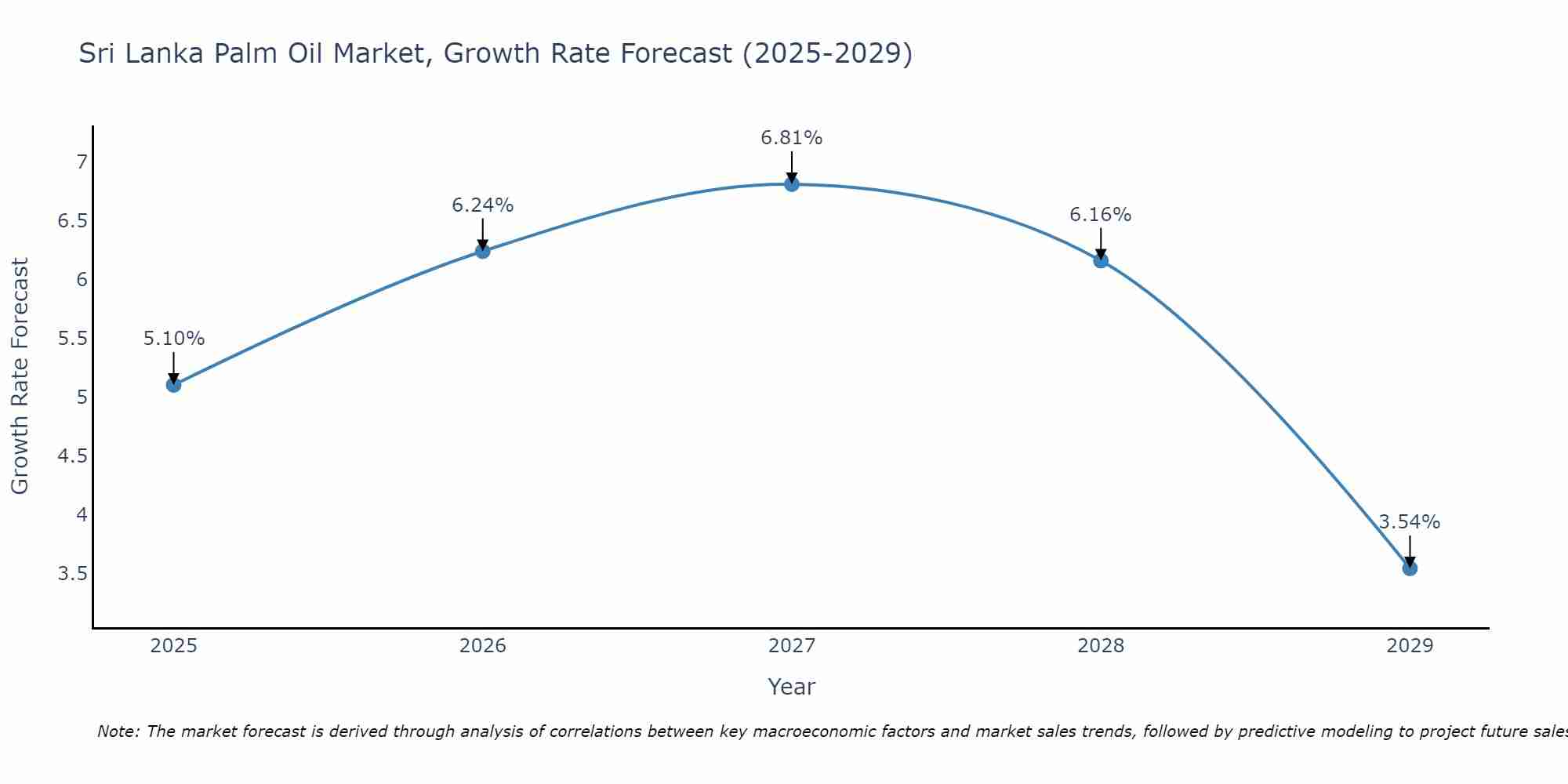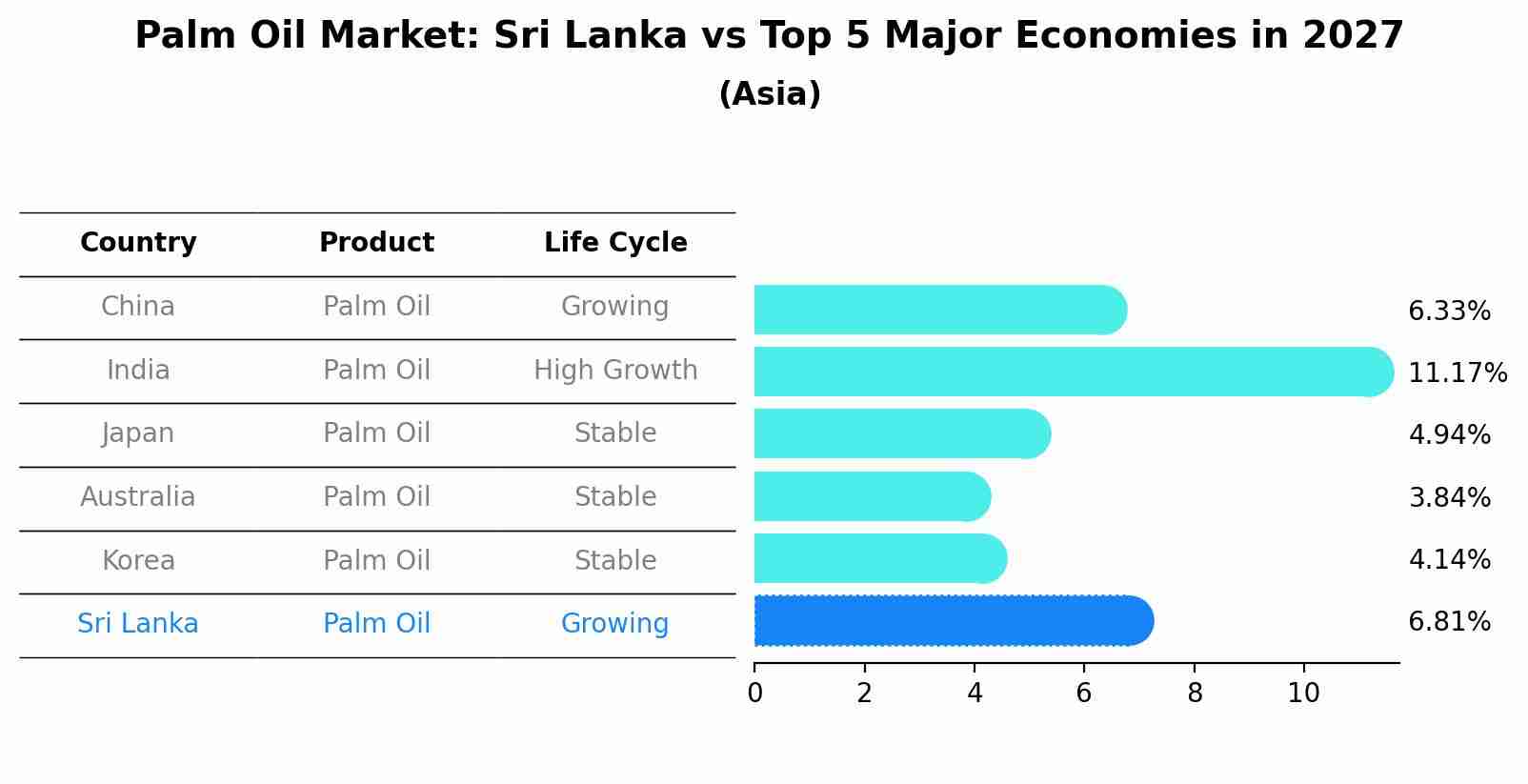Sri Lanka Palm Oil Market Outlook | Share, Size, Value, Revenue, COVID-19 IMPACT, Forecast, Trends, Industry, Growth, Analysis & Companies
| Product Code: ETC383791 | Publication Date: Aug 2022 | Updated Date: Jul 2025 | Product Type: Market Research Report | |
| Publisher: 6Wresearch | Author: Summon Dutta | No. of Pages: 75 | No. of Figures: 35 | No. of Tables: 20 |
Sri Lanka Palm Oil Market Size Growth Rate
The Sri Lanka Palm Oil Market is projected to witness mixed growth rate patterns during 2025 to 2029. Growth accelerates to 6.81% in 2027, following an initial rate of 5.10%, before easing to 3.54% at the end of the period.

Palm Oil Market: Sri Lanka vs Top 5 Major Economies in 2027 (Asia)
The Palm Oil market in Sri Lanka is projected to grow at a growing growth rate of 6.81% by 2027, highlighting the country's increasing focus on advanced technologies within the Asia region, where China holds the dominant position, followed closely by India, Japan, Australia and South Korea, shaping overall regional demand.

Sri Lanka Palm Oil Market Synopsis
The Sri Lanka Palm Oil Market is a significant player in the global palm oil industry, with the country being a key producer and exporter of palm oil. The market is characterized by a growing demand for palm oil in various industries such as food processing, cosmetics, and biofuel production. However, the industry has faced challenges in recent years due to sustainability concerns and environmental issues, leading to efforts to promote sustainable palm oil production practices. Sri Lanka`s palm oil market is also influenced by government policies and regulations, as well as global market trends. Despite these challenges, the market continues to grow, with opportunities for expansion in both domestic consumption and export markets.
Sri Lanka Palm Oil Market Trends
Currently, the Sri Lanka palm oil market is experiencing a growing demand for sustainable and certified palm oil products. Consumers are increasingly conscious of environmental and social impact, leading to a shift towards responsibly sourced palm oil. The government is also emphasizing the importance of sustainable practices in the palm oil industry, driving companies to adopt certifications such as RSPO (Roundtable on Sustainable Palm Oil). Additionally, there is a rising awareness among consumers about the health benefits of palm oil, further boosting its popularity in the market. However, there are challenges such as fluctuating global prices, concerns about deforestation, and competition from other cooking oils. Overall, the trend towards sustainability and quality in the Sri Lanka palm oil market is expected to continue shaping the industry in the coming years.
Sri Lanka Palm Oil Market Challenges
In the Sri Lankan palm oil market, one of the main challenges faced is the increasing pressure from environmental and sustainability concerns. Palm oil production has been linked to deforestation, habitat destruction, and negative impacts on biodiversity. This has led to consumer backlash and calls for more sustainable practices within the industry. Additionally, there are issues surrounding land rights and labor practices in palm oil plantations, with reports of exploitation and human rights violations. These challenges have put pressure on companies operating in the Sri Lankan palm oil market to adopt more sustainable and responsible production methods, adhere to stricter regulations, and improve transparency in their supply chains to meet the growing demand for ethically sourced palm oil.
Sri Lanka Palm Oil Market Investment Opportunities
Investment opportunities in the Sri Lanka Palm Oil Market include plantation development, processing facilities, and value-added product manufacturing. With the government`s aim to increase palm oil production to reduce reliance on imports, there is a growing demand for investments in expanding plantation acreage and improving cultivation techniques. Additionally, setting up processing facilities to enhance local refining capacity can be a profitable venture. Furthermore, investing in the production of value-added products such as palm oil-based cosmetics, biofuels, and food products can cater to both domestic and export markets. However, investors should be mindful of sustainability practices and regulations to mitigate environmental risks and ensure long-term profitability in the Sri Lanka palm oil market.
Jordan Agar Market Government Policies
The Sri Lankan government has implemented various policies related to the palm oil market, aimed at promoting sustainable practices and protecting local industries. In 2019, the government announced a ban on the importation and cultivation of oil palm plants, citing environmental concerns and the need to safeguard the country`s biodiversity. This ban was later lifted in 2021, with new regulations imposed on the industry to ensure sustainable cultivation practices and environmental protection. Additionally, the government has encouraged the diversification of crops to reduce reliance on palm oil and promote local agricultural products. Overall, the government`s policies in the Sri Lankan palm oil market reflect a balancing act between environmental conservation, economic interests, and sustainable agricultural practices.
Sri Lanka Palm Oil Market Future Outlook
The future outlook for the Sri Lanka Palm Oil Market appears promising yet challenging. With increasing global demand for palm oil in various industries such as food, cosmetics, and biofuels, there is an opportunity for growth in production and exports. However, the industry faces potential challenges related to sustainability and environmental concerns, as well as competition from other palm oil-producing countries. Sri Lanka`s commitment to sustainable practices and efforts to improve productivity and quality standards will play a crucial role in shaping the market`s future trajectory. Overall, the market is likely to see steady growth with a focus on sustainability, innovation, and meeting the evolving demands of consumers and regulatory bodies.
Key Highlights of the Report:
- Sri Lanka Palm Oil Market Outlook
- Market Size of Sri Lanka Palm Oil Market, 2021
- Forecast of Sri Lanka Palm Oil Market, 2031
- Historical Data and Forecast of Sri Lanka Palm Oil Revenues & Volume for the Period 2018 - 2031
- Sri Lanka Palm Oil Market Trend Evolution
- Sri Lanka Palm Oil Market Drivers and Challenges
- Sri Lanka Palm Oil Price Trends
- Sri Lanka Palm Oil Porter's Five Forces
- Sri Lanka Palm Oil Industry Life Cycle
- Historical Data and Forecast of Sri Lanka Palm Oil Market Revenues & Volume By Nature for the Period 2018 - 2031
- Historical Data and Forecast of Sri Lanka Palm Oil Market Revenues & Volume By Organic for the Period 2018 - 2031
- Historical Data and Forecast of Sri Lanka Palm Oil Market Revenues & Volume By Conventional for the Period 2018 - 2031
- Historical Data and Forecast of Sri Lanka Palm Oil Market Revenues & Volume By Product for the Period 2018 - 2031
- Historical Data and Forecast of Sri Lanka Palm Oil Market Revenues & Volume By CPO for the Period 2018 - 2031
- Historical Data and Forecast of Sri Lanka Palm Oil Market Revenues & Volume By RBD Palm Oil for the Period 2018 - 2031
- Historical Data and Forecast of Sri Lanka Palm Oil Market Revenues & Volume By Palm Kernel Oil for the Period 2018 - 2031
- Historical Data and Forecast of Sri Lanka Palm Oil Market Revenues & Volume By Fractionated Palm Oil for the Period 2018 - 2031
- Historical Data and Forecast of Sri Lanka Palm Oil Market Revenues & Volume By End-use for the Period 2018 - 2031
- Historical Data and Forecast of Sri Lanka Palm Oil Market Revenues & Volume By Food & Beverage for the Period 2018 - 2031
- Historical Data and Forecast of Sri Lanka Palm Oil Market Revenues & Volume By Personal Care & Cosmetics for the Period 2018 - 2031
- Historical Data and Forecast of Sri Lanka Palm Oil Market Revenues & Volume By Biofuel & Energy for the Period 2018 - 2031
- Historical Data and Forecast of Sri Lanka Palm Oil Market Revenues & Volume By Pharmaceuticals for the Period 2018 - 2031
- Historical Data and Forecast of Sri Lanka Palm Oil Market Revenues & Volume By Others for the Period 2018 - 2031
- Sri Lanka Palm Oil Import Export Trade Statistics
- Market Opportunity Assessment By Nature
- Market Opportunity Assessment By Product
- Market Opportunity Assessment By End-use
- Sri Lanka Palm Oil Top Companies Market Share
- Sri Lanka Palm Oil Competitive Benchmarking By Technical and Operational Parameters
- Sri Lanka Palm Oil Company Profiles
- Sri Lanka Palm Oil Key Strategic Recommendations
Frequently Asked Questions About the Market Study (FAQs):
- Single User License$ 1,995
- Department License$ 2,400
- Site License$ 3,120
- Global License$ 3,795
Search
Thought Leadership and Analyst Meet
Our Clients
Related Reports
- Afghanistan Rocking Chairs And Adirondack Chairs Market (2026-2032) | Size & Revenue, Competitive Landscape, Share, Segmentation, Industry, Value, Outlook, Analysis, Trends, Growth, Forecast, Companies
- Afghanistan Apparel Market (2026-2032) | Growth, Outlook, Industry, Segmentation, Forecast, Size, Companies, Trends, Value, Share, Analysis & Revenue
- Canada Oil and Gas Market (2026-2032) | Share, Segmentation, Value, Industry, Trends, Forecast, Analysis, Size & Revenue, Growth, Competitive Landscape, Outlook, Companies
- Germany Breakfast Food Market (2026-2032) | Industry, Share, Growth, Size, Companies, Value, Analysis, Revenue, Trends, Forecast & Outlook
- Australia Briquette Market (2025-2031) | Growth, Size, Revenue, Forecast, Analysis, Trends, Value, Share, Industry & Companies
- Vietnam System Integrator Market (2025-2031) | Size, Companies, Analysis, Industry, Value, Forecast, Growth, Trends, Revenue & Share
- ASEAN and Thailand Brain Health Supplements Market (2025-2031) | Strategy, Consumer Insights, Analysis, Investment Trends, Opportunities, Growth, Size, Share, Industry, Revenue, Segments, Value, Segmentation, Supply, Forecast, Restraints, Outlook, Competition, Drivers, Trends, Demand, Pricing Analysis, Competitive, Strategic Insights, Companies, Challenges
- ASEAN Bearings Market (2025-2031) | Strategy, Consumer Insights, Analysis, Investment Trends, Opportunities, Growth, Size, Share, Industry, Revenue, Segments, Value, Segmentation, Supply, Forecast, Restraints, Outlook, Competition, Drivers, Trends, Demand, Pricing Analysis, Competitive, Strategic Insights, Companies, Challenges
- Europe Flooring Market (2025-2031) | Outlook, Share, Industry, Trends, Forecast, Companies, Revenue, Size, Analysis, Growth & Value
- Saudi Arabia Manlift Market (2025-2031) | Outlook, Size, Growth, Trends, Companies, Industry, Revenue, Value, Share, Forecast & Analysis
Industry Events and Analyst Meet
Whitepaper
- Middle East & Africa Commercial Security Market Click here to view more.
- Middle East & Africa Fire Safety Systems & Equipment Market Click here to view more.
- GCC Drone Market Click here to view more.
- Middle East Lighting Fixture Market Click here to view more.
- GCC Physical & Perimeter Security Market Click here to view more.
6WResearch In News
- Doha a strategic location for EV manufacturing hub: IPA Qatar
- Demand for luxury TVs surging in the GCC, says Samsung
- Empowering Growth: The Thriving Journey of Bangladesh’s Cable Industry
- Demand for luxury TVs surging in the GCC, says Samsung
- Video call with a traditional healer? Once unthinkable, it’s now common in South Africa
- Intelligent Buildings To Smooth GCC’s Path To Net Zero


















